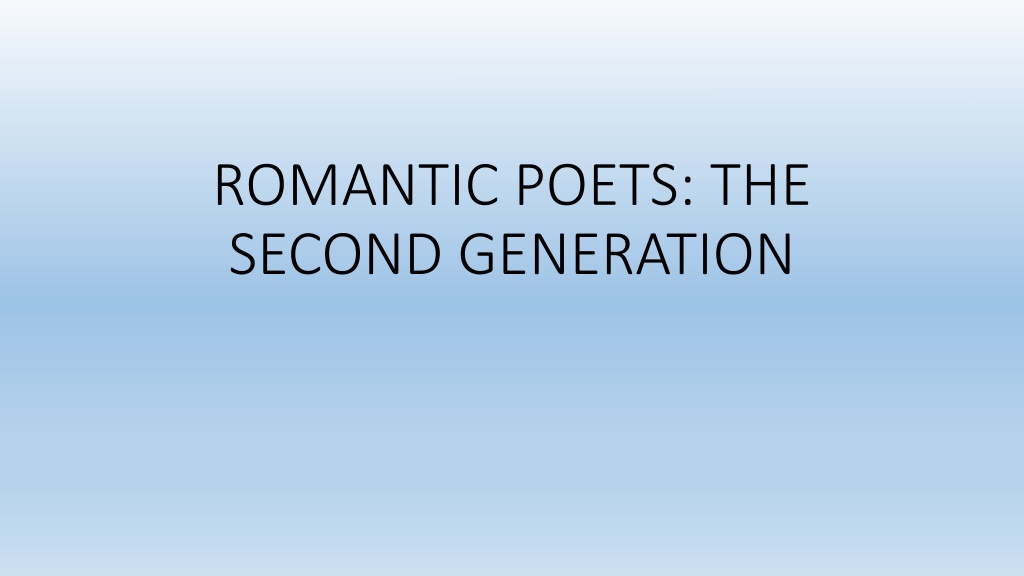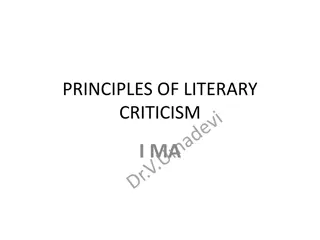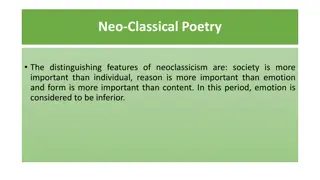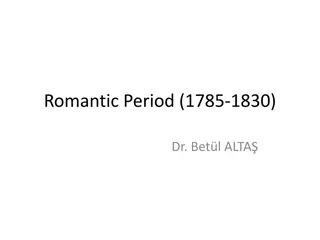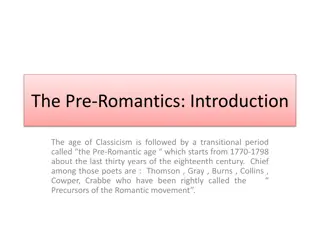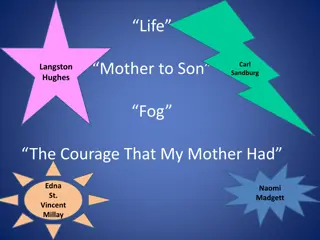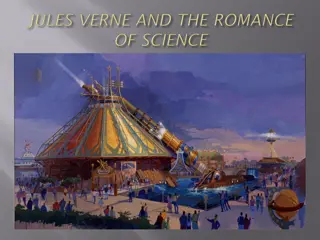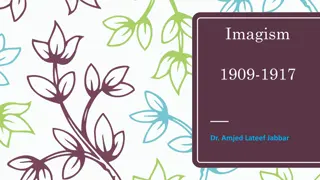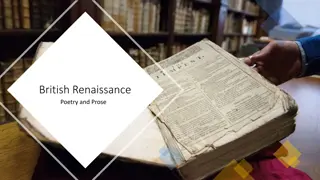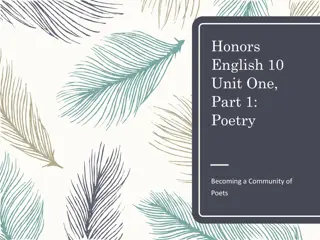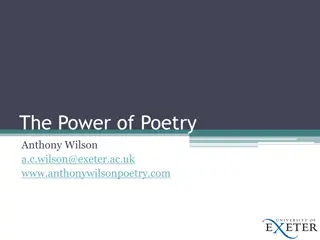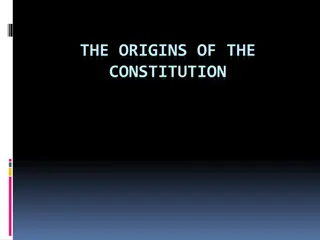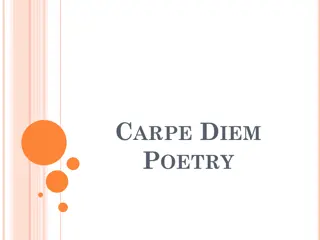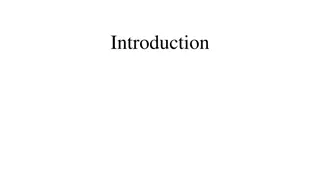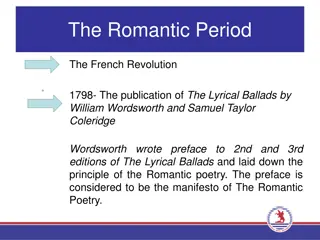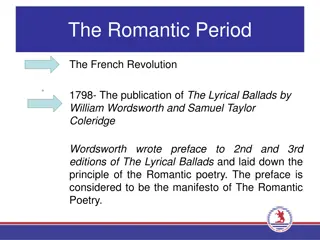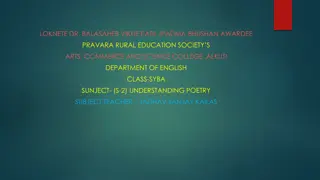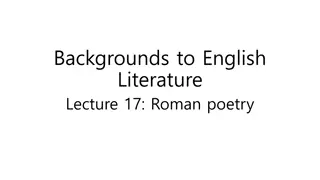The Second Generation of Romantic Poets: A Revolution in Poetry and Ideals
The second generation of Romantic poets, including Keats, Byron, and Shelley, rebelled against societal norms, championing freedom, individuality, and social change. Their poetry reflects a struggle with language's limitations in expressing profound emotions and ideas. Percy Bysshe Shelley emerges as a passionate rebel advocating for moral awakening, societal rebirth, and the power of poetry to transform civilization through universal forces. Their works challenge conventions and ideologies of their time, paving the way for a new era of artistic expression and enlightenment.
Download Presentation

Please find below an Image/Link to download the presentation.
The content on the website is provided AS IS for your information and personal use only. It may not be sold, licensed, or shared on other websites without obtaining consent from the author. Download presentation by click this link. If you encounter any issues during the download, it is possible that the publisher has removed the file from their server.
E N D
Presentation Transcript
ROMANTIC POETS: THE SECOND GENERATION
Romantic poets: the second generation 1) A complex and refined LANGUAGE -A common sense of failure of art to express life and feelings: their poems often reflect on the limits of language, incapable of expressing their inner world; 2)A generation of YOUNG POETS -Main poets: Keats, Byron and Shelley They all have a brief and intense life; They travel all over Europe (grand tour). During their journeys they expose themselves to different cultural and intellectual contexts that strengthen their opposition to conventions and rules of the contemporary society.
3) The idea of FREEDOM and REBELLION The Byronic hero embodies this concept very well. He fights against conventions and rules. Nothing is more important to Byron and to the heros in his poems than human freedom, the freedom to follow one s desire. 4) The promotion of a SOCIAL CHANGE against all forms of tyranny
P. B. Shelley: a passionate rebel and a radical thinker In his pamphlets he expresses clearly his view of society: The Necessity of Atheism (1811), a pamphlet about the absence of rational evidence of the existence of God; An Adress to the Irish People (1812), a pamphlet encouraging the Irish to rebel against the English government The Revolt of Islam (1818), a pamphlet about the failure of the French Revolution and an invitation to fight oppressors
The Poet as a hero for a moral awakening According to Shelley, the world is dominated by inequalities and moved by selfishness. In all his works Shelley calls for a rebirth of society in order to realize a social and moral regeneration of man. The poets are those who, more than anyone, can contribute to this plan of civilization. How? Through POETRY Although an atheist, S. believes in the existence of a UNIVERSAL FORCE which pervades nature and realizes itself in art. By giving voice to this unifying power in the celebration of life and beauty, poetry could bring about a good moral in the world.
The limitations of language in expressing the absolute In S. s poems the words appear to be inadequate to express the essence of his ideas. The words and objects of S. s poems are like masks that cover some inexpressible absolute. S. and all the poets of second generation agree on the failure of words to express the idea. A symbol of this incapability of giving voice to the deep essence of reality is the AIR, a very recurrent element in S. s production
ODE TO THE WEST WIND (I) O wild West Wind, thou breath of Autumn's being, thou, from whose unseen presence the leaves dead are driven, like ghosts from an enchanter fleeing, Yellow, and black, and pale, and hectic red, pestilence-stricken multitudes: O, thou, who chariotest to their dark wintry bed the winged seeds, where they lie cold and low, each like a corpse within its grave, until thine azure sister of the spring shall blow Her clarion o'er the dreaming earth, and fill (driving sweet buds like flocks to feed in air) with living hues and odours plain and hill: Wild Spirit, which art moving every where; destroyer and preserver; hear, O, hear! [I] O selvaggio vento dell Ovest, tu alito dell essenza dell Autunno, dalla cui presenza invisibile sono mosse le foglie morte, come fantasmi in fuga da un incantatore, gialle, e nere, e pallide, e rosse di febbre, moltitudini afflitte da pestilenza: o, tu, che trasporti al loro cupo, invernale letto i semi con le ali, dove giacciano gelidi e in profondit , come un cadavere nella sua tomba, finch la tua azzurra sorella, la Primavera, suoner sopra la Terra in sogno la sua tromba, e riempir (conducendo dolci semi nell aria come greggi al pascolo) con colori e profumi sgargianti, collina e pianura: spirito selvaggio, che ti muovi per ogni dove; distruttore e preservatore; ascolta, ascolta!
(IV) () Oh! lift me as a wave, a leaf, a cloud! Oh! Sollevami come onda, come foglia, come nuvola! Crollo sulle spine della vita! Sanguino! Un incombente peso ha incatenato e curvato qualcuno a te troppo simile: senza paura, e rapido, e orgoglioso. I fall upon the thorns of life! I bleed! A heavy weight of hours has chained and bowed one too like thee: tameless, and swift, and proud.
(V) ()Be thou, spirit fierce, Sii tu, spirito fiero, il mio spirito! Sii me, spirito impetuoso! Guida i miei morti pensieri per l universo come foglie ingiallite che stimolino una nuova nascita! E, per l incanto di questa ode, diffondi, come ceneri e scintille da un cuore inesausto, la mia profezia tra tutta l umanit ! E sii attraverso la mia voce per la Terra dormiente la tromba della profezia! O vento, se giunge l Inverno, pu essere la Primavera cos distante? my spirit! Be thou me, impetuous one! Drive my dead thoughts over the universe like withered leaves to quicken a new birth! And, by the incantation of this verse, scatter, as from an unextinguished hearth ashes and sparks, my words among mankind! Be through my lips to unawakened earth the trumpet of a prophecy! O, wind, if Winter comes, can Spring be far behind?
